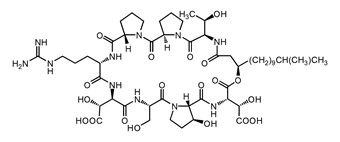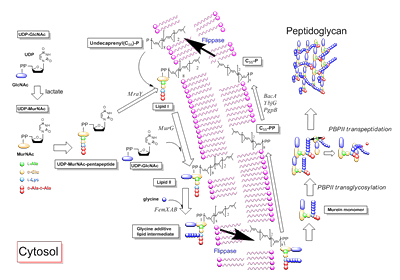Tripropeptin (TPPC)
- Project Leader, Hideki Hashizume
MRSA (methicillin resistant Staphylococcus aureus) and VRE (vancomycin resistant Enterococcus sp.) are Gram-positive bacteria and one of the normal microbial flora, and also known as pathogens of opportunistic infectious diseases. They cause severe infections such as sepsis, pneumonia and endocarditis in immunocompromised hosts and have much ability to acquire resistance to available drugs. Vancomycin has been the last resort for the treatment of MRSA but its efficacy is limited because of the emergence of vancomycin intermediate resistant- and highly resistant-bacteria. Under these circumstances, new drugs effective against those pathogens are urgently needed.
Tripropeptin C, a cyclic lipopeptide antibiotic produced by Lysobacter sp., isolated from a soil sample collected in Okinawa prefecture, was discovered in 2001 (Fig. 1).

view
The discovery of TPPC stemmed from research on compounds effective against MRSA and without cross-resistance to vancomycin. TPPC shows very potent antimicrobial activity against Gram-positive bacteria including resistant strains (MRSA, VRE, PRSP) and excellent therapeutic efficacy in a mouse staphylococcal septicemia model when administered intravenously (45th ICAAC, Interscience Conference on Antimicrobial Agents and Chemotherapy) Distribution data supported a marked therapeutic efficacy of TPPC in mice. A study for the mode of action of TPPC revealed the blocking of peptidoglycan biosynthesis (Fig. 2) with different mode of action from vancomycin, daptomycin and bacitracin.

view
Studies for the mode of action, efficacies in a mouse MRSA/VRE septicemia model, distribution were presented at 50th ICAAC.